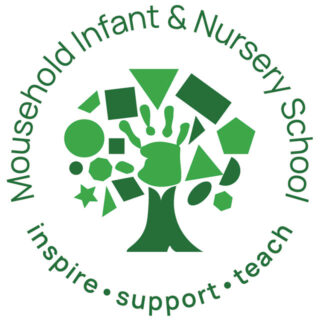Thank you to all the families who attended our new intake meeting. Here is the PowerPoint the EYFS teachers shared with you.
The Just One Norfolk website has some great videos on starting school too:
https://www.justonenorfolk.nhs.uk/school-life/resources-for-families/starting-school/
Early Years Foundation Stage (EYFS)
At Mousehold Infant and Nursery School, we are committed to delivering an outstanding early years education that builds a strong foundation for lifelong learning. Our EYFS curriculum is designed to support the holistic development of every child, guided by our core values: Respect, Help, Learn, Enjoy and Achieve.
Intent
We view the EYFS as a crucial period for establishing strong foundations in the Prime Areas of Communication and Language, Personal, Social, and Emotional Development, and Physical Development. We also focus on the Specific Areas of Literacy, Mathematics, Understanding the World, and Expressive Arts and Design. Our curriculum is designed to be broad and balanced, supporting each child’s unique needs and interests.
Our approach is driven by the Characteristics of Effective Learning—Playing and Exploring, Active Learning, and Creating and Thinking Critically. We strive to foster a love of learning, encourage risk-taking, problem-solving, and the development of creativity and critical thinking skills.
Implementation
In our classrooms, children engage in play that is either independent or collaborative, choosing resources and directing their activities. Adults play a crucial role in scaffolding children’s play, helping to elevate their learning by modeling skills, providing clues, asking questions, and gradually withdrawing support as children gain mastery. This process helps children develop problem-solving skills and social-emotional abilities.
We deliver our EYFS curriculum through a mix of teacher-led and child-initiated activities, with a strong emphasis on outdoor learning. Our Forest Schools programme provides regular opportunities for children to connect with nature, develop life skills, and enhance their environmental awareness.
Our classrooms are thoughtfully designed to create stimulating and purposeful learning environments, both indoors and outdoors. Children have the freedom to explore resources and make connections across different areas of learning through our thematic approach.
A key aspect of our approach is the Focus Child method, where each week, selected children become the focus of close observation and detailed documentation. This method allows us to gain a deep understanding of each child’s interests, strengths, and areas for development, ensuring that our planning and support are tailored to meet their individual needs.
Working in Partnership with Parents
We value the vital role that parents and carers play in their child’s education. From the outset, we work closely with families to understand each child’s interests, needs, and developmental stage. Parents are encouraged to participate in ‘All About Me’ booklets, attend stay-and-play sessions, and share observations from home. Regular communication and opportunities for parental involvement help build strong partnerships and ensure that our support is aligned with each child’s needs.
Reading
Early reading is at the heart of our curriculum. We use the ‘Little Wandle’ phonics scheme to teach reading in a structured and systematic way. Children have access to phonically matched books to support their reading development. We encourage regular reading at home and provide resources and workshops for parents to support their child’s reading journey. By fostering a love of reading and building strong phonics skills, we prepare children for confident and fluent reading as they progress.
Community Links
We believe in enriching children’s learning through strong community connections. Throughout the year, we arrange visits from local community members to discuss their jobs and careers and provide opportunities for children to engage with various aspects of their community. These experiences help children connect with their surroundings and foster a sense of empathy and social responsibility.
Impact
We begin by establishing baseline assessments for children in Reception and engage in thorough observations in Nursery to understand each child’s individual needs. This initial knowledge helps us plan and adapt the curriculum effectively.
Ongoing formative assessment through daily interactions and observations enables us to provide personalised support and extend each child’s learning. Regular summative assessments in key areas, such as communication and language and phonics, help us monitor progress and identify any necessary interventions.
By the end of the EYFS, we aim for children to communicate and listen effectively, demonstrate independence, and be well-prepared for Key Stage One. They will show progress in understanding concepts, skills, knowledge, and vocabulary, and exhibit the ability to take risks, correct mistakes, think creatively, and solve problems.
At Mousehold Infant and Nursery School, we are dedicated to providing an exceptional EYFS experience that aligns with our values and sets our pupils up for success in their educational journey and beyond.
Useful Links
Early Years Foundation Stage Profile
Reception Phonics Home Learning
Every half term we will upload an overview of the phonics content to be covered. You will also receive a printout to support your child’s learning at home. For further information about how we teach reading at Mousehold, please visit the phonics and reading page on our website or speak to a member of the school team.


